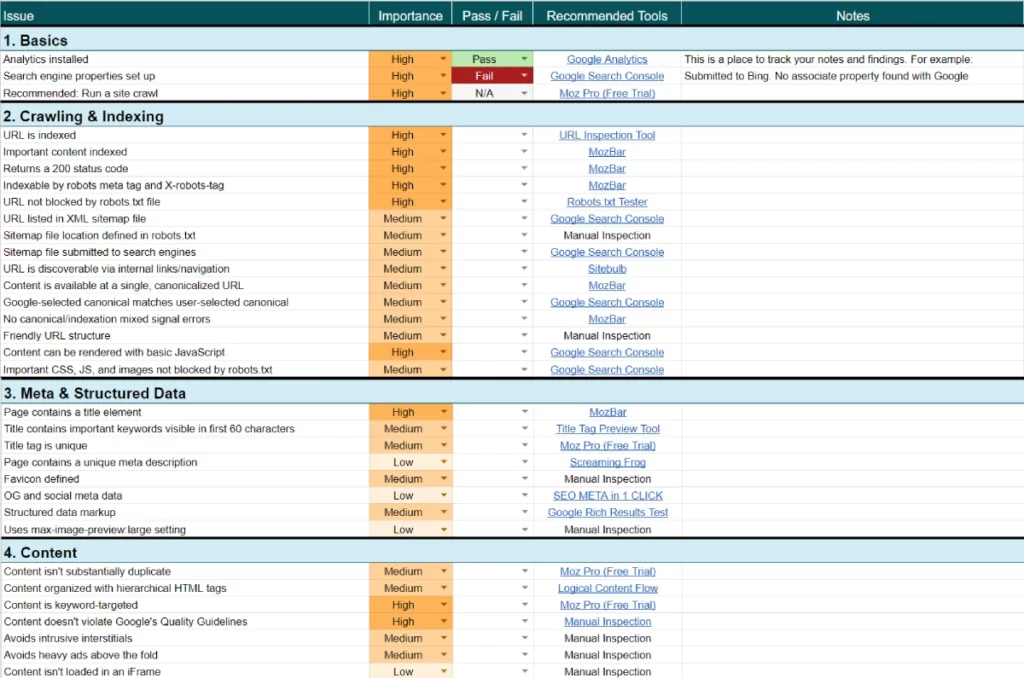Website SEO Audit to Analyze and Improve Your Website’s SEO Performance
What’s an SEO Audit? It’s one of the most important things to do if you want to improve your website’s search engine performance.
Google even recommends you conduct an audit before you launch your site and then another one periodically afterward.
If you’re unfamiliar with what exactly an SEO audit entails or why it’s so important, keep reading!
In this article, we’ll explain everything you need to know about the technical aspects of SEO, including how to perform a website SEO audit.
A website SEO audit can be intimidating if you’re not used to this type of analysis, but don’t let that stop you from doing it.
There are several reasons why conducting an SEO audit on your website will ultimately benefit you and your business.
As a business owner, website owner, or general web surfer, you’ve probably heard the terms SEO Audit and Website SEO Audit before and wondered what they were all about.
It might seem like an audit is something only big businesses with lots of resources would do, but in reality, it can help any business improve its search rankings, which means more traffic and leads to your website.
What is an SEO audit?
An SEO audit is an inspection of your website for potential improvement in search engine optimization.
Conducting an SEO audit requires a critical analysis of the search engine’s crawl, index, and rank content.
Because many factors are involved, conducting a thorough SEO audit is time-consuming and must be performed regularly (at least monthly) to remain valid.
Here’s what you need to know about SEO audits – including different types of audits as well as promising tools for conducting them on your site.
What does SEO Audit include?
A technical SEO audit is a comprehensive report on code formatting and accessibility to site load time and user experience.
The purpose of an audit is to analyze your website for errors, mistakes, bugs, usability problems, pages that are not working as intended or out-of-date content.
It helps you understand how search engines work and what you need to optimize your website for high rankings.
An audit also includes recommendations on how to improve your site’s efficiency. After all, what good is a fast page if nobody wants it?
What follows is a detailed guide that will show you how we conduct our audits at Marketer. To know exactly what SEO tools we use along with strategies we follow to perform the best SEO audit services of any website.
Why is an SEO audit essential?
An SEO audit is essential for anyone who wants their site to rank well in search engines.
It allows you to look at all aspects of your site’s technical configuration, content quality, on-page, and off-page elements.
The audit can then be used as a guide for improvement where you will be able to focus on changes that will produce results from an SEO perspective.
Generally speaking, there are two types of audits in SEO services: technical or website audits and link-building audits.
The technical part of the SEO audit
If you’ve been following SEO best practices, you probably have a good idea of how your website looks from an on-page perspective.
Things like meta tags, H1s, etc., but there is a whole other part of your website that matters just as much if not more; The Technical part.
This includes factors such as domain authority, hosting/server speed, page load time, and other things that affect how Google crawls your site.
I recommend using an SEO audit tool called SEO Checker which will give you a comprehensive overview of these technical factors in less than 2 minutes.
Here is what it looked like for the Marketer website when we ran it (as shown below), but yours will vary depending on many factors.

Write Better SEO Copy
When writing your SEO copy, make sure that you’re naturally using keywords in your copy.
Please don’t force them into your copy for SEO purposes; your readers will know and will end up leaving your site because of it.
Keep it conversational, natural, and relevant to what you’re writing about; if you do, people will want to stay on your site longer.
Finally, ensure that you have a solid link-building strategy in place so that Google knows what to do with all of those incoming links coming from other sites.
A solid strategy means you’ll be getting backlinks organically (i.e., not through a black hat or spammy tactics). This way, you won’t have any penalty issues with Google down the road.
You know that search engine optimization (SEO) is a big deal if you run a website. But to optimize your site for search engines like Google, you need more than just keywords; you need well-written, targeted content that appeals to human visitors as well.
On-Page Optimization
The first thing you should do is ensure that your website has a proper domain. For example, using www instead of HTTP or HTTPS can decrease visibility.
Other than that, make sure you have a title tag on each website page. Google uses those titles in search results, and having them could increase your click-through rate (CTR).
Other than that, ensuring there are no duplicate content issues would be a good idea and making sure there are no broken links within your website.
As for meta descriptions, it is best to keep them brief yet informative.
SEO Audit Checklist 2022
The Technical SEO Audit is often confused with Website Audits, but they are two very different things. Here is an example of a technical audit checklist.
There are many types of technical website audits, such as HTML, usability, link structure, XML sitemaps, Flash websites (yes, there are still), and more.
A typical website audit goes beyond just checking for broken links. Here is a list of essential items to look for in your website audit checklist
Technical SEO
- WWW site version
- Use canonical tag
- SSL Setup
- Create Sitemap
- Robot.txt edits
- Fix broken links
- Fix missing metadata
- Use of no follow tags
- Structure permalinks
- Make short URLs
- Create & optimize 404 page
Configure website & analytics
- Google analytics setup
- Search console-setup
- Setup Bing Webmaster
- Setup Yandex Webmaster
- Create Privacy Policy
- Create Contact Us Page
- Configure about us page
- Setup Keyword Tracking
- Set up Backlink Monitoring
Fix Site Performance
- Test Site Performance
- Switch to good hosting
- Use CDN services
- Add cache plugin
- Minify CSS/ JS
- Optimize images
- Add image alt text
- Use lazy load for images
- Optimize database
- Speed up website
On-page Optimization
- Keyword Research
- Use SEO optimized content
- Add keywords in URL, H1 & first paragraph
- Use LSI keywords in the content
- Add SEO plugins for WordPress site
- Do internal linking to relevant pages
- Add authoritative backlinks
- Use schema markup
- Optimize Dwell Time
Since you guys read all the way down, we have a gift for you. Copy our SEO audit 2022 checklist and use it for your website for free.




